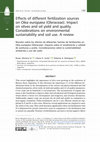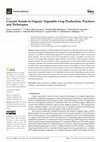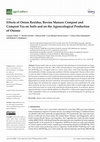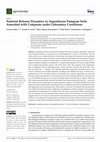Papers by Roberto Rodriguez

Lilloa
This review highlights the importance of olive trees growing in the southwest of Buenos Aires, Ar... more This review highlights the importance of olive trees growing in the southwest of Buenos Aires, Argentina. It also discusses the importance (1) of the different fertilizations forms in the determination of the various soil physicochemical and leaf chemical properties, olives yield, oil yield and quality, and (2) oil quality parameters. Cover crops can be beneficial to soil properties. The incorporation of organic manures is also beneficial to improve plant and soil physical and biological properties, which allows a better root development and longevity, and nutrient absorption. Additionally, organic crops can increase the oil yield and quality in comparison to non-organic treatments. Foliar fertilization can be a very efficient system for supplying N, P and K to olive trees. However, several applications are required to meet the needs of the crop. Olive yield decreases significantly when soil fertilization with N is eliminated for several consecutive years in comparison to the fertil...

El Informe Técnico 2013 de Agroecología reafirma en sus once capítulos los ámbitos institucionale... more El Informe Técnico 2013 de Agroecología reafirma en sus once capítulos los ámbitos institucionales por los cuales circulo la información y la propuesta de trabajo en Red durante el período 2010-2012. Las tecnologías y conocimientos obtenidos en cada una de las unidades participantes de INTA, se refieren a si temas de producción de importancia regional, en los cuales ya se advierte la necesidad de trazar nuevos rumbos para muchos de los procesos de la agricultura vista de forma agroecológica en nuevos escenarios. Su título Bases tecnológicas de sistemas de producción agroecológicos hace alusión al modo en que la tecnología ambien puede contribuir a este nuevo enfoque interdisciplinario, siendo un puente entre las bases científicas y metodológicas de las disciplinas agronómicas y biológicas y su aplicabilidad al manejo productivo y la evaluación de agro-ecosistemas de manera integradora y holística. Sus nodos de funcionamientos agrícola ganadero, horticultura orgánica, cultivos perenn...

Horticulturae
Organic farming is a holistic production management system that promotes and enhances agroecosyst... more Organic farming is a holistic production management system that promotes and enhances agroecosystem health, including biodiversity, biological cycles and soil biological activity, and consequently, it is an efficient and promising approach for sustainable agriculture within a circular and green economy. There has been a rise in the consumption of organic vegetables in the last years because of their organoleptic properties, higher nutritive value and lower risk of chemical residues harmful to health. The recent scientific evidence regarding the use of the major elements responsible for organic vegetable crop production indicates plant material, soil management and crop nutrition, soil disinfection, crop management and pest, disease and weed management. These techniques are the focus of this study. In general, the main outcomes of this review demonstrate that a great effort of innovation and research has been carried out by industry, researchers and farmers in order to reduce the env...

Agriculture, 2021
Organic solid wastes are rarely considered when planning for rural production in Argentina. Onion... more Organic solid wastes are rarely considered when planning for rural production in Argentina. Onion production in the low valley of Río Colorado (Buenos Aires) generates between 12,000 and 20,000 Mg year−1 of vegetal wastes (i.e., leaves, stems, skins, roots) from harvesting, cleaning and classification of bulbs, causing many problems with their management. The aim of this work is to study the effect of different doses of onion residue-bovine manure compost and onion residue-bovine manure compost tea on the soil physicochemical properties, microbial activity and agroecological onion production in sandy soil. Results showed that the highest dose of compost caused the highest effects on soil pH, electrical conductivity and nutrient content. Soil enzymatic activities were already high in the soil before the compost was applied, which may have contributed to the small effect caused by any dose on soil activity. A significant positive effect on bulb weight and organic onion yield were foun...

Agronomy, 2022
Composted manure is the greatest nitrogen (N) source in organic agriculture, where the use of che... more Composted manure is the greatest nitrogen (N) source in organic agriculture, where the use of chemical fertilizers, except the use of rock phosphate as P source, is not allowed. The aim of this study was to evaluate the effect of the soil type and compost characteristics on the potential rates of mineralization and on the kinetics of the nitrogen (N), phosphorus (P), and carbon (C) release patterns. For this, an aerobic incubation study was conducted over the course of 119 days at 25 °C using two different composts as amendments: a compost from biosolids and wood shavings (CRUB), and a compost from poultry manure with wheat straw (CSP). The composts were incorporated into two different soils of contrasting texture, sandy loam (S1) and silty clay loam (S2), at the dose of 160 kg N ha−1. Samples were collected eight times during the incubation period. The N and C dynamics were studied separately according to the different soil type. In both soils, a predominance of the nitrification p...

Uploads
Papers by Roberto Rodriguez